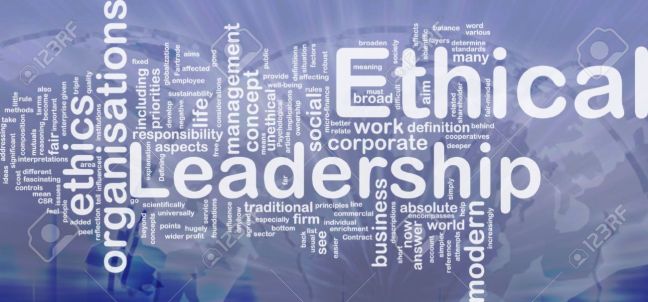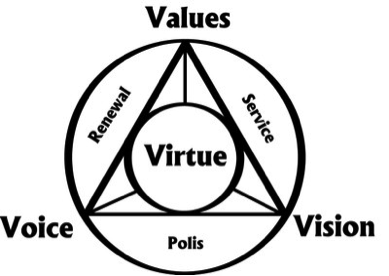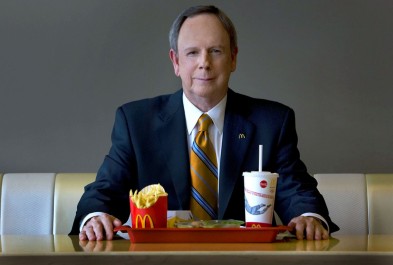
“Ethical Leadership is defined as “the demonstration of normatively appropriate conduct through personal actions and interpersonal relationships, and the promotion of such conduct to followers through two-way communication, reinforcement and decision-making”… [and] the evidence suggests that ethical leader behavior can have important positive effects on both individual and organizational effectiveness” (Rubin et al 2010: 216-17).
Present corporations and organization have to face ethical leadership as one of the burning issues to conduct beneficial business. The issue of ethical leadership is often misunderstood in business. The number of corporate scandals has been recently increased along with financial crisis. For instance, Lay and Skilling, Enron’s leaders, were far away from ethical leadership, trustful relations and ethical behavior as well. As the result of the accounting cooperation with Enron, a big accounting company Arthur Andersen was destroyed.
People do not trust business leaders in building sustainable institutions (Bill 2010). In this blog, I will discuss what is necessary for a good ethical leader, providing the effective leadership and the stable development of organization.
Deontological and teleological perspectives
Normative ethical theories are divided into deontological and teleological perspectives. A deontological theory is based on the specific moral obligations and duties, which are self-evident and have intrinsic value. According to the deontological theory, moral actions can be evaluated due to rightness or wrongness (Ethics at a Glance 2015).
These approaches consider the ethical leadership as “good” phenomenon in connection with moral principles (Lakshmi 2014). The Confucian approach supports the moral leadership, and argues that leadership bases equally on “moral principles and the ethical vision of a good life” (Becker 2009).
According to Immanuel Kant moral universal principles should be acted without any exception and people need to do “what is morally right, regardless of the consequences” (Johnson 1952). Holmes (1993) described strong deontological theories, in which “goodness is irrelevant to the rightness of an act”, and weak deontological theories, in which “goodness is relevant”.
In contrast, a teleological theory states the rightness or wrongness of actions and is based on the “goodness or badness of their consequences” The examples of teleological theories are ethical egoism and utilitarianism. (Ethics at a Glance 2015).
4 V model of ethical leadership
For better understanding the relations between leadership and ethics, it is necessary to describe the 4 V model of ethical leadership. It was created by B.Grace as a framework that balances the “internal beliefs and values with the external behaviors and actions” in order to achieve the common good. To implement this model it is necessary to follow 4 steps.

Figure 1: 4 Values model of ethical leadership (Ghuman 2010).
- Values: The ethical leaders have to understand the core values for identifying themselves.
- Vision: The ethical leaders need to think and shape a future for goals’ achievements.
- Voice: The ethical leaders need to articulate the vision in order to motivate others to action.
- Virtue: The ethical leaders need to behave virtuously in order to do well for common goal (Ghuman 2010).
Examples of Good ethical leaders and unethical leadership
Despite so many examples of ethical and unethical leadership at present, in this part of the blog we will discuss the experience of Jim Skinner, McDonald’s CEO, as one of the best examples of a good ethical leadership. In contrary, another negative example of unethical leadership will be also shown.

Jim Skinner applied a coaching leadership style, and he is seen as a leader and symbolic promoter of the company’s ideas and initiatives (McDonald’s Corporation 2008). He is a really “charismatic and transformational leader, who “reinvented” the corporation “with a new vision and direction” (Hume 2007). His successful leadership focuses on customer satisfaction, creativity, the way how people present themselves and do not lose the primary objectives (Hume 2007).
On the other side, such leaders as Bruno A Kaelin, the former vice president of Alstom and David Colby the former CFO of Wellpoint can be characterized by unethical and immoral influence on the corporations, full of professional flubs (Kostigen 2009). Bruno A Kaelin was accused of a bribery case, while David Colby had relations with 30 women.
Recommendations of a good ethical leadership
Leadership means to be responsible and ethical in private and professional life. Ethical leaders are the models of behavior for their followers both in the organization and group. (Phil 2015). An ethical leader should have various peculiarities and characteristics, such as honesty, the ability to make decisions in favor of the leading organization, to use the power according to ethical norms and requirements.
Jaramillo, Bande, & Varela (2015) consider the leadership as phenomenon related to ethical climate. According to (Russell and Stone 2002) ethical leaders follow the principles of integrity. Leaders play a significant role in preserving an ethical climate in organization (Reed 2011). Bart (2011) argues that ethics is extremely important and should be widely used in business in order to conduct moral principles.
George (2010) argues that aligned employees need to commit values of the organization being “the part of something greater than themselves”. A good example of an aligned organization is Johnson & Johnson, which uses their Credo values in leading the company. According to George (2010) in order to be an effective leader, he should be able to sustain excellent results during the extended period of time and focus on the customers. Only “authentic leaders”, as well as aligned, empowered and collaborative employees will be able to lead the organization to long-term and profitable business results (George 2010).
A strong ethical leadership, with articulated values, culture and vision, adherence to ethical standards and responsible norms as well as honesty and trust to customers, employees and stockholders provide organizations with a strategic advantage and sustainable development.
References
Assumptions in Normative Ethics [online] available from <http://rhchp.regis.edu/hce/ethicsataglance/DeontologicalTeleological/DeontologicalTeleological_01.html> [12 February 2016]
Bart, C. (2011) ‘Ethics: The Key to Organizational Culture’, Canadian Manager, Business Source Complete, EBSCOhost, 36, 3, pp. 4-6
Bill, G. (2010) The New 21st Century Leaders [online] available from <https://hbr.org/2010/04/the-new-21st-century-leaders-1/> [11 February 2016]
Ethics at a Glance. `(2016) Deontological and Teleological
Hume, S. (2007) McDonald’s CEO Jim Skinner – R&I’s , Executive of the Year [online] available from <http://www.rimag.com/article/CA6553963.html> [13 February 2016]
Jaramillo, F. & Varela, J. (2015) Servant leadership and ethics: a dyadic examination of supervisor behaviors and salesperson perceptions’, Journal of Personal Selling & Sales Management Business Source Complete, EBSCOhost, 35, 2, pp. 108-124.kkk
Johnson, C. (1952) Meeting the Ethical Challenges of Leadership: Casting Light or Shadow. New Delhi: Sage 4th ed.
Karminder, K. (2010) Management: Concepts, Practice & Cases [online] available from <https://books.google.kz/books?id=QfxemvtRxo4C&pg=PA406&dq=4+V+model+of+ethical+leadership&hl=ru&sa=X&ved=0ahUKEwi634LN0c3LAhWrj3IKHbgUBQYQ6AEILTAC#v=onepage&q=4%20V%20model%20of%20ethical%20leadership&f=false> [14 February 2016]
Kostigen, T. (2009) The 10 most unethical people in business [online] available from <http://www.marketwatch.com/story/the-10-most-unethical-people-in-business> [08 February 2016]
Lakshmi, B (2014) Leadership Ethics in Today’s World: Key Issues and Perspectives’, ASCI Journal Of Management, Business Source Complete, EBSCOhost, 44, 1, pp. 66-72
McDonald’s Corporation (2008) [online] available from <http://www.mcdonalds.com/corp.html> [11 February 2016]
Phil, R. (2015) Article leadership [online] available from <http://ctb.ku.edu/en/table-of-contents/leadership/leadership-ideas/ethical-leadership/main> [12 February 2016]
Reed, L. & Scott R. (2011) A New Scale to Measure Executive Servant Leadership: Development, Analysis, and Implications for Research. Journal of Business Ethics 101 (3): 415 – 4 34. doi : 10.1007/ s10551-010-0729-1.
Robert L. Holmes (2013) The Ethics of Nonviolence [online] available from<https://books.google.kz/books?id=0XbHAgAAQBAJ&printsec=frontcover&dq=The+Ethics+of+Nonviolence:+Essays+by+Robert+L.+Holmes&hl=ru&sa=X&ved=0ahUKEwiitIjRzs3LAhWp_HIKHY68CQQQ6AEIHjAA#v=onepage&q=The%20Ethics%20of%20Nonviolence%3A%20Essays%20by%20Robert%20L.%20Holmes&f=false> [14 February 2016]
Russell, F. (2002) A Review of Servant Leadership Attributes: Developing a Practical Model. ” Leadership & Organizational Development Journal 23 (3): 145 – 157. doi : 10.1108/01437730210424
Hi Assiya, read your post. Well done. You used very good examples of ethical leaders.
I want to know if there are some challenges in creation of ethical climate?
LikeLiked by 1 person
Thank you very much for your comments. Surely, Incivility, harassment, aggression, and discrimination can produce an unethical and hostile work environment, which can create dissatisfied employees, while a positive ethical environment can make employees more productive and even happier.
LikeLiked by 1 person
Thank you very much, Assiya! A good answer. I definately agree with your opinion and believe that ony patience, the disire to overcome these challenges for better results are beneficial for creation ethical climate.
LikeLike
Hello! I read your post with a great interest. Thanks a lot.
Nevertheless, how important is it for you to be an ethical leader? Thank you very much.
LikeLiked by 1 person
Hello! Nice to hear from you. Thank you for your comments.
Ethical leadership is extreamely important for me. My dream is to be a successful leader in future, as though to reach my goal I need to learn how to be an ethical leader, because they have a tremendous impact on how people in their organizations behave and what they achieve.
Thanks a lot!
LikeLike
Hello! A very interesting post, congratulations, well done! Can you tell me if ethical leaders have special characteristics or not?
LikeLiked by 1 person
Hello! Thank you for your comments. Answering your question I can say the following.
Ethical leaders first of all should have such personal characteristics as compliance, social conscience and moral principles. They should behave accoring to clearly defined rules, make decisions and do best what’s best for others, as well as to act with integrity, having a moral compass, or being values drive.
LikeLike
Hello!Your post is very important and interesting for me. I agree with your ideas about the role of ethical leader in business and his significance for organisation’s success. Nevertheless, I want to know do you consider yourself as an ethical leader? And what are exactly your moral compass?
LikeLiked by 1 person
Hi! Thank you for your comments. I will try to answer your questions. First of all I must say, that I do not consider myself as an ethical leader, though I would like to be. I know that in order to be an etical leader, I should have a set of personal principles for how to behave, make decisions and relate to other people.I believe, that my moral compass is my personal beliefs and values. what I mean by doing what’s right.
Thank you for your important questions.
LikeLike
Well, thank’s a lot for your honest reply. I do hope that you will be a successful ethical leader in future and I wish you good luck!
Once again I am very pleased with your answer.
LikeLiked by 1 person
Hello! I like your post. Can you explain me the role of communication skills in leadership? Do you think that leader without communication skills meets a blank expression of employees and has some problems? I would like to know your opinion. Thanks in advance.
LikeLike
Hello! Many thanks for your comments and interest. I like your question. Moreover, I definately agree with you. In my opinion, leader has to focus on honing his communication skills, because the ability to clearly and succinctly describe what you want done is extremely important. Therefore, if a leader can’t relate his vision to the team, he won’t be able to work towards the same goal.
Thank you very much for your interest.
LikeLike